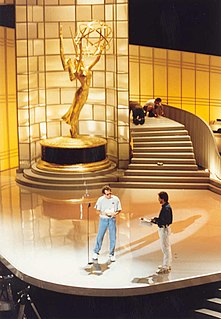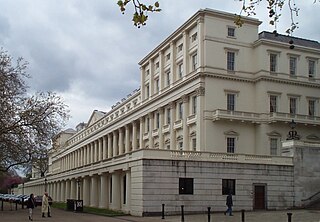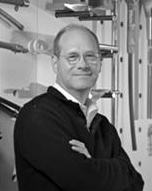
The Fields Medal is a prize awarded to two, three, or four mathematicians under 40 years of age at the International Congress of the International Mathematical Union (IMU), a meeting that takes place every four years.

The National Medal of Science is an honor bestowed by the President of the United States to individuals in science and engineering who have made important contributions to the advancement of knowledge in the fields of behavioral and social sciences, biology, chemistry, engineering, mathematics and physics. The twelve member presidential Committee on the National Medal of Science is responsible for selecting award recipients and is administered by the National Science Foundation (NSF).

An Emmy Award, or simply Emmy, is an American award that recognizes excellence in the television industry. It is presented at numerous annual events held throughout the calendar year, each honoring one of the various sectors of the television industry. The two ceremonies that receive the most media coverage are the Primetime Emmy Awards and the Daytime Emmy Awards, which recognize outstanding work in American primetime and daytime entertainment programming, respectively. Other notable Emmy events include those honoring national sports programming, national news and documentary shows, and technological and engineering achievements in television, including the Primetime Engineering Emmy Awards. Regional Emmy Awards are also presented throughout the country at various times through the year, recognizing excellence in local and statewide television. In addition, the International Emmy Awards honor excellence in TV programming produced and initially aired outside the United States.
Leslie Earl Robertson is an American engineer. He was the lead structural engineer of the Twin Towers of the original World Trade Center in New York City. He has since been structural engineer on numerous other projects, including the Shanghai World Financial Center and the Bank of China Tower in Hong Kong.
The Royal Swedish Academy of Engineering Sciences or Kungliga Ingenjörsvetenskapsakademien (IVA), founded on 24 October 1919 by King Gustaf V, is one of the royal academies in Sweden. The academy is an independent organisation, which promotes contact and exchange between business, research, and government, in Sweden and internationally. It is the world's oldest academy of engineering sciences.(OECD Reviews of Innovation Policy: Sweden 2012).

The Millennium Technology Prize is one of the world's largest technology prizes. It is awarded once every two years by Technology Academy Finland, an independent fund established by Finnish industry and the Finnish state in partnership. The prize is presented by the President of Finland. The Millennium Technology Prize is Finland's tribute to innovations for a better life. The aims of the prize are to promote technological research and Finland as a high-tech Nordic welfare state. The prize was inaugurated in 2004.

The Royal Academy of Engineering (RAEng) is the UK's national academy of engineering.
Arup is a multinational professional services firm headquartered in London which provides engineering, architecture, design, planning, project management and consulting services for all aspects of the built environment. Founded by Sir Ove Arup in 1946, the firm has over 16,000 staff based in 96 offices across 35 countries around the world. Arup has participated in projects in over 160 countries.

The Institution of Engineering and Technology (IET) is a multidisciplinary professional engineering institution. The IET was formed in 2006 from two separate institutions: the Institution of Electrical Engineers (IEE), dating back to 1871, and the Institution of Incorporated Engineers (IIE) dating back to 1884. Its worldwide membership is currently in excess of 168,000. The IET's main offices are in Savoy Place in London, England and at Michael Faraday House in Stevenage, England.
The MacRobert Award is regarded as the leading prize recognising UK innovation in engineering by corporations. The winning team receives a gold medal and a cash sum of £50,000.

Robert Samuel Langer, Jr. FREng is an American chemical engineer, scientist, entrepreneur, inventor and one of the twelve Institute Professors at the Massachusetts Institute of Technology.

The Leverhulme Medal is awarded by the Royal Society every three years "for an outstandingly significant contribution in the field of pure or applied chemistry or engineering, including chemical engineering". It was created in 1960 after a donation by the Leverhulme Trust to mark the 300-year anniversary of the foundation of the Royal Society, and is accompanied by a £2000 gift. Since its creation it has been awarded 21 times, and unlike other Royal Society medals such as the Royal Medal, it has never been awarded to the same person multiple times. Citizens of the United Kingdom have won the medal 19 out of the 21 times; the two foreign recipients have been Man Mohan Sharma, an Indian citizen who was awarded the medal in 1996 "for his work on the dynamics of multi-phase chemical reactions in industrial processes", and Frank Caruso, Australian chemical engineer, awarded the medal in 2019. Two of the Leverhulme Medal winners also won the Nobel Prize in Chemistry: Archer John Porter Martin, who won the medal in 1963 for "his distinguished and fundamental discoveries in chromatography and its application" and the Nobel Prize in 1952, and Cyril Norman Hinshelwood, who won the medal in 1960 for "his outstanding contributions to physical chemistry" and the Nobel Prize in 1956. Anne Neville became the first woman to receive the award in 2016.

The Sitara-i-Imtiaz, also spelled as Sitara-e-Imtiaz, is the third highest honour and civilian award in the State of Pakistan. It recognizes individuals who have made an "especially meritorious contribution to the security or national interests of Pakistan, world peace, cultural or other significant public endeavours".

Anthony Edward Tudor Browne is a British writer and illustrator of children's books, primarily picture books, with fifty titles to his name. For his lasting contribution as a children's illustrator he won the biennial international Hans Christian Andersen Award in 2000, the highest recognition available to creators of children's books. From 2009 to 2011 he was Children's Laureate.

The Prince Philip Medal is named after Prince Philip, Duke of Edinburgh, who is the Senior Fellow of the Royal Academy of Engineering (RAE). In 1989 Prince Philip agreed to the commissioning of solid gold medals to be "awarded periodically to an engineer of any nationality who has made an exceptional contribution to engineering as a whole through practice, management or education." The first of these medals was awarded in 1991 to Air Commodore Sir Frank Whittle.

Patrick Ness is a British-American author, journalist, lecturer and screenwriter. Born in the United States, Ness moved to London and holds dual citizenship. He is best known for his books for young adults, including the Chaos Walking trilogy and A Monster Calls.

William Frazier Baker, also known as Bill Baker, is an American structural engineer known for engineering the Burj Khalifa, the world's tallest building/man-made structure. He is currently a structural engineering partner in the Chicago office of Skidmore, Owings & Merrill, LLP (SOM).

Roger William Herbert Sargent FREng FSA was an English chemical engineer who was Courtaulds professor of Chemical engineering at Imperial College London and "the father" of the discipline of Process Systems Engineering.













